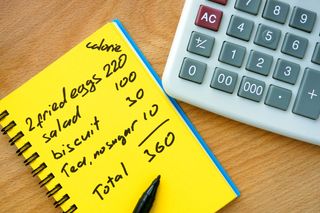Calorie smart meals
Calorie smart meals to site navigation Skip to Content This content does not have an English version. This content does not have an Arabic version. Brain tumor, breast cancer, colon cancer, congenital heart disease, heart arrhythmia.
Javascript is required in order to use this web app. Use the calorie calculator to estimate the number of daily calories your body needs to maintain your current weight. Select the statement that best describes your usual activity level. Inactive: Never or rarely include physical activity in your day. Somewhat active: Include light activity or moderate activity about two to three times a week. People judge the intensity of their activities differently. And activity levels can change over time.
So think of your calorie estimate as a starting point and adjust it up or down as you alter your activity level. Created by Mayo Foundation for Medical Education and Research based on Harris Benedict Equation and Institute of Medicine Dietary Reference Intakes. Privacy assurance: Information that you enter won’t be saved or sent to any website. Mayo Clinic does not endorse companies or products. Advertising revenue supports our not-for-profit mission. Mayo Clinic Press Check out these best-sellers and special offers on books and newsletters from Mayo Clinic Press. Reprint PermissionsA single copy of these materials may be reprinted for noncommercial personal use only.
Mayo Clinic Healthy Living,” and the triple-shield Mayo Clinic logo are trademarks of Mayo Foundation for Medical Education and Research. The amount of energy in an item of food or drink is measured in calories. When we eat and drink more calories than we use up, our bodies store the excess as body fat. If this continues, over time we may put on weight. These values can vary depending on age, size and levels of physical activity, among other factors. When we eat and drink, we put energy into our bodies. Our bodies use up that energy through everyday movement, which includes everything from breathing to running.
To maintain a stable weight, the energy we put into our bodies must be the same as the energy we use through normal bodily functions and physical activity. An important part of a healthy diet is balancing the energy you put into your bodies with the energy you use. For example, the more physical activity we do, the more energy we use. If you consume too much energy on 1 day, do not worry. Just try to take in less energy on the following days. The calorie content of many shop-bought foods is stated on the packaging as part of the nutrition label. This information will appear under the “Energy” heading.

The calorie content is often given in kcals, which is short for kilocalories, and also in kJ, which is short for kilojoules. A kilocalorie is another word for what’s commonly called a calorie, so 1,000 calories will be written as 1,000kcals. Kilojoules are the metric measurement of calories. To find the energy content in kilojoules, multiply the calorie figure by 4. The label will usually tell you how many calories are contained in 100 grams or 100 millilitres of the food or drink, so you can compare the calorie content of different products. Many labels will also state the number of calories in 1 portion of the food.
But remember that the manufacturer’s idea of 1 portion may not be the same as yours, so there could be more calories in the portion you serve yourself. You can use the calorie information to assess how a particular food fits into your daily calorie intake. Many of these can be downloaded and used for free. The NHS cannot verify their data, but they can be helpful to track your calories by recording all of the food you eat in a day. Some restaurants put calorie information on their menus, so you can also check the calorie content of foods when eating out. Calories should be given per portion or per meal.